| Srl | Item |
| 1 |
ID:
175137


|
|
|
|
|
| Summary/Abstract |
Media researchers have often examined how film and television can have an impact on audiences. Media have various effects on audience members. When it comes to representing ‘the other’, the media often rely on stereotypes. Research has shown that ethnic Arabs are under-represented in US film and television, and their depictions are distorted with stereotypical portrayals. The current study joins the discussion on ‘media representation’ (in this case, informed by the construct of Occidentalism) by conducting a qualitative, thematic, content analysis (informed by narrative analysis, both socio-linguistic and socio-cultural) of the Jordanian television show My American Neighbor. Stereotypes can be both positive and negative, and they are often used by media storytellers regardless of their background or location in the World.
|
|
|
|
|
|
|
|
|
|
|
|
|
|
|
|
| 2 |
ID:
128888
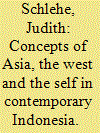

|
|
|
|
|
| Publication |
2013.
|
| Summary/Abstract |
This paper explores the imaginations of Asia, the West and various self-concepts in contemporary, post-Reformasi Indonesia. Departing from a problematization of the underlying concepts in recent social science literature, the author asks how Indonesians construct their moral order and their sense of Self, 'Asia' or 'the East' by constructing a Western counterpart. This question is traced with respect to various religious and spiritual orientations and to Indonesian popular culture. Finally, relocated orientations towards other imagined centres in the Global South and East are considered as potential indicators of an increasingly decentred world. The study is grounded in empirical fieldwork with people from various walks of life in different regions of Indonesia.
|
|
|
|
|
|
|
|
|
|
|
|
|
|
|
|
| 3 |
ID:
173206
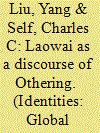

|
|
|
|
|
| Summary/Abstract |
Homogeneous ethnic labels, deriving from migrants’ phenotypic and cultural distinctness, are frequently utilised to single them out as the Other during intercultural encounters. Nonetheless, the Othering enacted by ethnic labelling has not attracted enough attention from host-nationals who use these labels. In-depth interviews with 35 American expatriates revealed that laowai was perceived as a discourse of Othering, which first categorised Westerners under this label as the Other in mainland China for their noticeable non-Chinese physical appearance, and then exposed them to its Chinese users’ diversely motivated stereotyping in such forms as exclusion, alienation and discrimination. However, Chinese people had not noticed laowai’s nature of being a stereotype-laden discourse of Othering and conversely considered this label as a neutral and even friendly expression. Ultimately, these Americans experienced Chinese people’s habitual use of laowai as a way to separate them as permanent outsiders who were subject to Occidentalism in mainland China.
|
|
|
|
|
|
|
|
|
|
|
|
|
|
|
|
| 4 |
ID:
116869
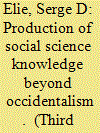

|
|
|
|
|
| Publication |
2012.
|
| Summary/Abstract |
This article makes the case for a post-exotic anthropology as an alternative disciplinary practice adapted to the emerging historical conjuncture that is reconfiguring the political and epistemic relations between different parts of the world. This is raising anew a legitimation challenge to mainstream social sciences but especially academic anthropology, as its a practice is still characterised by a chronic exoticist inflection thanks to its allegiance to the epistemology of Occidentalism. The article calls for a revision of anthropology's geo-theoretical premises in light of an emergent post-exotic historical conjuncture, which entails the abandonment of the duopoly exercised by the epistemic regimes of postmodernism and postcolonialism, in favour of a post-exotic standpoint. It suggests the adoption of mesography as the optimum means of operationalising a post-exotic anthropology as well as an alternative mode of social science knowledge production. Finally, it proposes an ethic of reciprocity to rectify the extractive fieldwork practices that sustain the illiberal politics of interpretation of academic anthropology.
|
|
|
|
|
|
|
|
|
|
|
|
|
|
|
|
| 5 |
ID:
089329
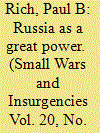

|
|
|
|
|
| Publication |
2009.
|
| Summary/Abstract |
This paper explores historically Russia's status as a great power in first the European and later the global states system. It argues that its role as a 'superpower' was really a temporary aberration during the Cold War period and that since the collapse of the Soviet Union Russian foreign policy has been essentially guided by the desire to reaffirm its great power status and emergence as an energy superpower centred on the export of oil and gas. Western policy towards Russia needs to be guided by a far more sophisticated awareness of this transformation and a greater understanding of the importance of the symbols of power and status that might look rather dated and backward looking in terms of the construction of regional European security and the 'post-national' project of the European Union.
|
|
|
|
|
|
|
|
|
|
|
|
|
|
|
|
| 6 |
ID:
095622
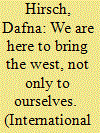

|
|
|